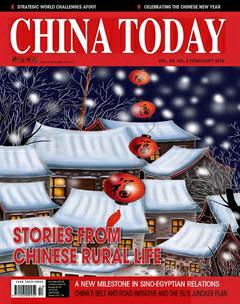On Chinese Media
On Chinese Media

China Economic Weekly
Issue No. 1, 2016
Questions about Supply-side Reform
Supply-side reform has become a new catchword in Chinese economics and politics since the Central Economic Work Conference concluded on December 21, 2015. A breakaway from the previously touted growth triad – investment, consumption, export – it signifies a seismic revision of China’s macro-regulation approach.
The latest Central Economic Work Conference set the priority areas for 2016 as eliminating superfluous industrial capacity, cutting housing inventories and business costs, reducing government debt, and streamlining administrative procedures.
In this issue’s feature story we get down to the nitty-gritty of supplyside reform by raising and answering five questions: What is supply-side reform? Why is it important? Why is it being introduced at this time? What will be done for this reform? And what benefits will it bring to the people? We reveal that supply-side reform is an innovative tactic for China to adapt to and maneuver the economic “new normal,” and a voluntary choice to acclimate itself to new global competition in the post-crisis era.

Life Weekly
Issue No. 1, 2016
A Brief History of the Future
In a survey conducted last December by Ericsson on 100,000 consumers in 40 countries, half of all respondents said they believed that smart phones would be replaced by artificial intelligence in five years. Science fiction and imagination have reshaped the future of humankind through the joint efforts of capital and hi-tech companies. Google, IBM, Amazon, Baidu, Tencent, Alibaba, Apple, and Tesla have all jumped on the bandwagon. Hands-free interaction between people and objects now seems highly likely in the near future.
Deplorably, the human imagination always falls short of the future man creates. The prediction by German physicist Gustav Kirchhoff that physics in the second half of the 19th century would see no more significant discoveries was proved wrong by the quantum theory. Halford Mackinder declared that the age of discovery ended in 1900. As it turned out, humankind’s exploration of the world has never stopped, and we now delve even deeper into outer space. So far Star Trek is still deemed visionary and fictional, but who knows whether the scenarios in the film will play out in reality in a century’s time.
Man’s journey into the future is never ending.

Oriental Outlook
Issue No. 49, 2015
China’s SCO Impetus
Since its expansion from the Shanghai Five founded in 1996, the Shanghai Cooperation Organization (SCO) has failed to come up with a grand economic and trade cooperation program that involves all its members, which vary widely in terms of economic might, development level, geological environment, and resources. With one of its two wheels – economy and security – missing, the chariot of the organization has been crippled.
As the SCO enters its second decade, the Silk Road Economic Belt proposed by China aptly meets its demand to enhance solidarity among its members. SCO members are all major countries along the “Belt and Road,” and the disparity in their development levels and resources indicates complementarity.
In 2014 Premier Li Keqiang reached consensus with Kazakh leaders on bilateral production capacity cooperation. China has accumulated remarkable technological and production capacity advantages. By providing its peer SCO members with high quality equipment, China can help them accelerate the pace of industrialization and urbanization.

Capital Week
Issue No.99, 2015
Plowing the
“Asset Wilderness”
The recent high-profile purchase of Vanke and SPD Bank stocks by insurance funds attests to the spreading frustration over the current “asset wilderness” – a lack of good investment options – among Chinese investors. It has trigged wide debate since the third quarter of 2015, when the stock market no longer offered stable returns, and yields on the debt market fell to their nadir.
As economic growth slows down and business costs edge up, the profit rate of investment in the real economy is on the decline, prompting businesses to roll back on operations to reduce investment.
Starting in the second half of 2015, the de-leveraging inflexion point sneaked into the real economy. Meanwhile reduction of the reserve requirement ratio and interest cuts have caused a fall in asset profits to outpace debt costs, narrowing the gap between bank deposits and lending interest. Under such dual pressure, the financial sector is also dancing to the tune of de-leveraging.
The “asset wilderness,” however, presents a silver lining for China’s financial industry.

